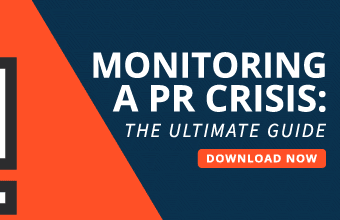What’s the biggest nightmare for a famous person or brand? A PR crisis. Yet, it’s almost inevitable. Anyone who’s always in the public eye is bound to face one at some point.
That’s why it’s important to learn how to handle a PR crisis, even if you’re lucky enough to never face one.
And that’s why I’ve written this guide on how to handle a PR crisis. But before we get to that, let’s first understand what a PR crisis is and why it’s such a nightmare.
A PR crisis happens when an event or action causes public backlash towards a person or organization. It could be anything from a celebrity saying the wrong thing to a brand posting a controversial ad or marketing communication. Anything that stirs up a reaction among the masses and starts a negative conversation about you or your brand is a PR crisis.
A PR crisis can be very harmful to your reputation and can have long-lasting effects if not handled properly and swiftly. You may have spent years building your brand and it can all go away with one big PR crisis that’s allowed to fester and grow.
That’s why it’s important to learn how to handle a PR crisis. If you’re prepared for it, you will not react to the situation but manage it responsibly.
In the next section, you will learn some of the best tips on how to handle a PR crisis.
7 tips on how to handle a PR crisis
Here are seven of the most effective tips on how to handle a PR crisis.
Use these to handle your next PR crisis effectively and prevent it from becoming a big PR nightmare.
Here we go.
1. Take responsibility
The first lesson in this guide on how to handle a PR crisis is to take responsibility for whatever happened. Don’t try to cover it up, handle it responsibly.
If you’re caught trying to cover things up, it’ll cause more damage and make you look guilty, even if you aren’t. So, take responsibility and take things from there.
Try to answer people’s questions and concerns, and post a press release to control the situation. That brings us to the next tip on how to handle a PR crisis.
2. Control the narrative
In case of a PR crisis, things can escalate very quickly if you let the media and the masses make their assumptions and interpretations.
That’s why the most important tip on how to handle a PR crisis is to get ahead of the story and control the narrative.
Before things go out of control proactively take control of the situation and get your story out.
Take time to strategize with your team and then craft your message. Give a quick and early response to control the narrative and then take your time to go into the detailed response.
Sometimes, you’ll need help from your industry contacts and influential people, who can counter some of the negative online chatter about you or your business. So, manage your contacts over B2B business database platforms like Zoominfo alternatives as well and keep them handy for situations like these where you may need to call in a few favors.
You can also use a CRM solution to organize your contact information and access it on short notice.
3. Understand the situation
While it’s important to be proactive and control the narrative, don’t say anything if you don’t yet understand the situation. Use media monitoring and social listening to keep track of online conversations around your brand.
You can have a spokesperson give an initial response while you take time to understand the situation better and respond properly. Understand people’s concerns, brainstorm solutions, and then prepare a response.
This doesn’t mean that you go completely missing in action as that would hint that you have something to hide. Instead, be available to answer people’s questions, but don’t comment on the situation until you know exactly what to say.
You can always say “no comments” and buy time till you can respond properly.
4. Respond, don’t react
Continuing with the previous point, you should respond to the situation with a complete understanding of it, instead of reacting impulsively.
This is probably the most crucial tip on how to handle a PR crisis.
When a PR crisis arises, it’s often followed by a lot of social media backlash. It’s easy to react when everyone is pointing fingers at you or saying hurtful things.
Don’t.
If you react impulsively, you’ll end up saying something that you’ll regret later. So, prepare a well-thought-out response and manage the PR crisis logically.
Use crisis communication tips from experts to craft your response.
5. Apologize and take corrective action
In some cases, a PR crisis arises as a result of a mistake on your part or your company’s part.
Maybe one of your employees acted irresponsibly and that caused a major problem. Or maybe your product or system failed and caused an accident.
It may be a one-off situation for which you could not be held personally liable. Still, as the owner of the company, apologize to the people affected and take measures to correct the situation.
If you shrug off your responsibility, you’ll have another PR nightmare on your hands.
So, the best way to handle a PR crisis is to apologize and inform people about what you’re going to do about the situation. Whatever corrective action you plan to take, take it quickly and inform people that you’ve set things right.
The longer you wait to take action, the worse the situation will become.
On the other hand, quick action on your part will show that you care and will improve your brand image.
Need an example?
Some time back, the CEO of Better.com fired ~900 employees via a Zoom call, which led to one of the biggest PR crises the company has ever faced. As a response to the media backlash, he wrote an apology letter for the way he handled things.
Here’s an excerpt from the letter.
Image via Better.com
6. Be polite on social media
As mentioned earlier, there could be a lot of social media backlash during a PR crisis. The best way to handle a PR crisis is to be polite on social media and not engage in conversations that can go wrong.
Be mentally prepared for this as soon as you hear about the PR crisis. Don’t take things personally and don’t let all the negative social media chatter affect you.
As a public figure, you should learn self-regulation and get trained on how to control yourself in situations where there’s a PR crisis.
If you feel you won’t be able to handle it yourself, stay away from social media and let your team handle things on your behalf.
That brings us to the last point in this guide on how to handle a PR crisis—having a response team. Let’s check it out.
7. Have a response team ready
You must have a PR team or a response team ready to handle PR crises.
This is not something that you should do after a PR crisis has arisen. Instead, be proactive and hire a team beforehand to handle such situations.
Whether you’re a business owner, a celebrity, or a mega influencer, you should have your own PR team. A PR team will not just help you handle a PR crisis, but will actively work towards building your online reputation and brand image.
Also, build relationships with influencers in your niche as they can act as an extension of your response team in case of a PR crisis. They can help spread the word about your side of the story and can counter some of the negative conversations about your brand. Apart from this you can hire an influencer marketing services for your influencer marketing campaign and boost your PR campaign ROI.
Ready to handle your next PR crisis?
While I hope that you never need to use these tips on how to handle a PR crisis, I hope that this guide has prepared you well if you do face one.
A PR crisis can escalate very quickly if you don’t respond swiftly and effectively. So, use this guide on how to handle a PR crisis and manage the situation before it gets worse. All the best!









